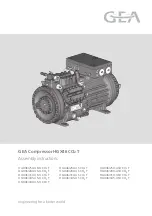
20
ments are within 1/16” (1.6 mm) of each other.
6. Tighten the motor drive pulley set screw.
7. Visually inspect the motor drive pulley to verify that it is per
-
pendicular to the drive motor shaft. Points B1 and B2 of Figure
should appear to be equal. If they are not, loosen the setscrew
of the motor drive pulley and equalize B1 and B2, using care
not to disturb the belt alignment performed in step 2.
8. Retighten the motor drive pulley setscrew. Torque to 145–165 in lbs
(16.4–20.3 Nm).
9. Reinstall belt guard.
Air Compressor Pump Intake and Exhaust
Valves
Once a year have a Trained Service Technician check the air com
-
pressor pump intake and exhaust valves.
Inspect Air Lines and Fittings for Leaks
1. Set the Auto/Off lever to “Off”, unplug the unit, and relieve all
air pressure from the air tank.
2. Apply a soap solution to all air line fittings and connections/
piping.
3. Correct any leaks found.
I
MPORTANT:
Even minor leaks can cause the air compressor
to overwork, resulting in premature breakdown or inadequate
performance.
Air compressor Head Bolts - Torquing
The air compressor pump head bolts should be kept properly
torqued. Check the torques of the head bolts after the first five
hours of operation. Torque to 14-16 ft.-lbs. (18.9–21.7 Nm).
Service and Adjustments
ALL MAINTENANCE AND REPAIR OPERATIONS NOT LISTED
MUST BE PERFORMED BY TRAINED SERVICE TECHNICIAN.
WARNING:
Risk of unsafe operation. Unit cycles automatically
when power is on. When servicing, you may be exposed to voltage
sources, compressed air, or moving parts. Before servicing unit
unplug or disconnect electrical supply to the air compressor, bleed
tank of pressure, and allow the air compressor to cool.
To Replace or Clean Check Valve
1. Release all air pressure from air tank. See
Draining Air Tank
in
the
Maintenance
section.
2. Set the Auto/Off lever to “Off”, unplug the unit, and relieve all
air pressure from the air tank.
3. Using an adjustable
In closed position
disc is visible.
In open
position
nothing is
visible.
Screwdriver
wrench loosen outlet
tube nut at air tank
and pump. Carefully
move outlet tube
away from check
valve.
4. Using an adjustable
wrench loosen pres
-
sure relief tube nut
at air tank. Carefully
move pressure relief tube away from check valve.
5. Unscrew the check valve (turn counterclockwise) using a 7/8”
open end wrench.
NOTE
the orientation for reassembly.
6. Using a screwdriver, carefully push the valve disc up and
down.
NOTE:
The valve disc should move freely up and down
on a spring which holds the valve disc in the closed position, if










































